Chia Seeds in Weight Loss
What Role Do Chia Seeds Play in Weight Loss?

Are you looking for a natural way to shed those extra pounds? Have you considered incorporating chia seeds into your diet?
These tiny, powerhouse seeds have gained popularity in the weight loss community for their numerous health benefits. With their low-calorie content, high fiber, blood sugar stabilizing effects, and appetite suppressing properties, chia seeds can be a valuable addition to your weight loss journey.
Discover the role chia seeds play in helping you achieve your weight loss goals.
Key Takeaways
- Chia seeds promote satiety and reduce overeating.
- Chia seeds offer a high fiber content, helping feel fuller for longer and prevent overeating.
- Chia seeds stabilize blood sugar levels and reduce the risk of diabetes.
- Chia seeds have appetite-suppressing properties, curbing appetite and reducing food intake.
Chia Seeds as a Low-Calorie Superfood
Chia seeds are a low-calorie superfood that can aid in your weight loss journey. These tiny seeds are packed with nutrients and have been shown to promote satiety, which can help you feel fuller for longer and reduce overeating.

Chia seeds contain a high amount of fiber, which not only aids in digestion but also supports healthy digestion. The soluble fiber in chia seeds forms a gel-like substance in your stomach, slowing down the absorption of food and keeping you satisfied.
Additionally, chia seeds are rich in omega-3 fatty acids, which have been linked to a reduced risk of obesity and improved metabolic health.
Incorporating chia seeds into your diet can be a simple and effective way to support your weight loss goals while enjoying a nutritious and satisfying meal.
The High Fiber Content of Chia Seeds
To support your weight loss goals, chia seeds offer a high fiber content that can help you feel fuller for longer and prevent overeating. Chia seeds are rich in dietary fiber, with just one ounce providing a whopping 10 grams of fiber. This high fiber content plays a crucial role in digestion and can have a significant impact on your overall health.

Fiber is essential for maintaining a healthy digestive system. It helps regulate bowel movements, prevents constipation, and promotes regularity. By adding chia seeds to your diet, you can ensure that your digestive system stays in optimal condition.
Here is a table highlighting the fiber content of chia seeds compared to other common foods:
| Food | Fiber Content (per 1 ounce) |
|---|---|
| Chia Seeds | 10 grams |
| Oatmeal | 4 grams |
| Brown Rice | 3.5 grams |
As you can see, chia seeds are an excellent source of fiber and can easily be incorporated into your diet. The high fiber content of chia seeds not only aids in digestion but also helps prevent constipation, ensuring that your weight loss journey is smooth and comfortable.
Speaking of digestion, chia seeds also have the added benefit of stabilizing blood sugar levels, which we’ll discuss in the next section.
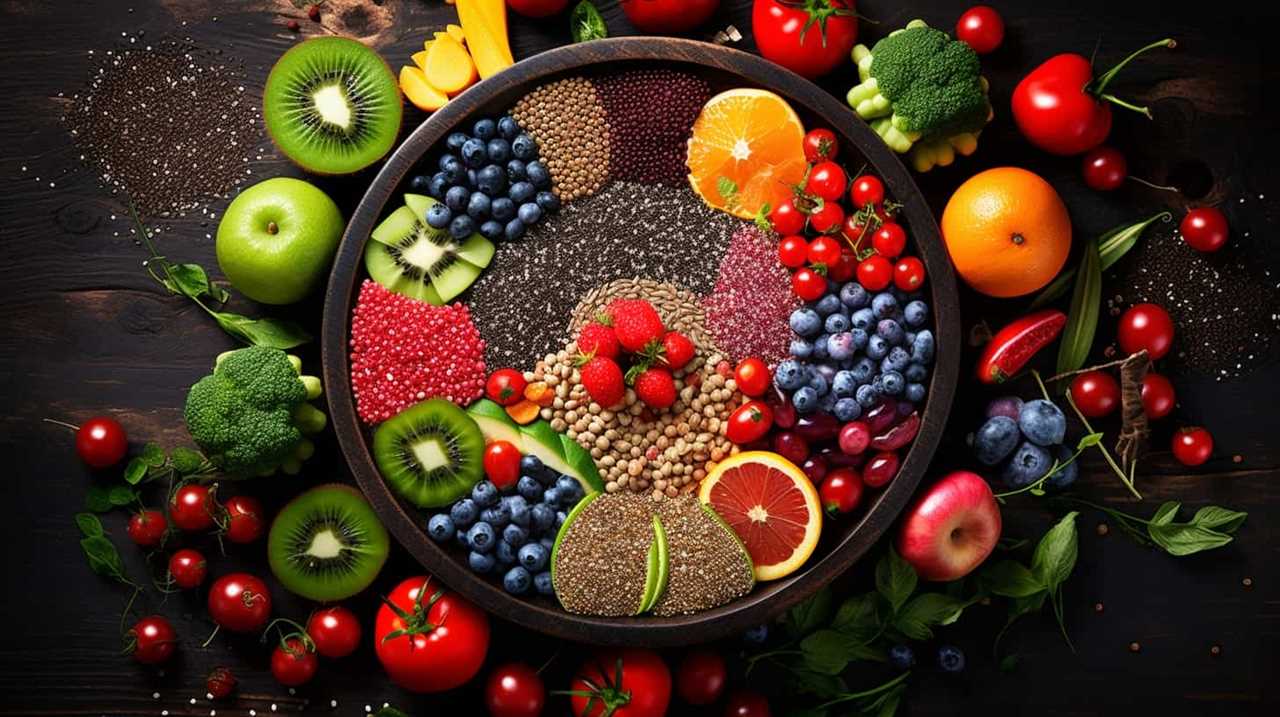
Chia Seeds and Their Blood Sugar Stabilizing Effects
Including chia seeds in your diet can have a significant impact on stabilizing your blood sugar levels.
Chia seeds are rich in soluble fiber, which forms a gel-like substance in your digestive system when mixed with water. This gel slows down the absorption of carbohydrates, preventing spikes in blood sugar levels.
Research has shown that consuming chia seeds can improve blood sugar regulation and reduce the risk of diabetes. A study published in the British Journal of Nutrition found that participants who consumed chia seeds experienced lower post-meal blood sugar levels compared to those who did not.
Another study published in Diabetes Care showed that chia seed consumption improved blood sugar control in individuals with type 2 diabetes.

Incorporating chia seeds into your diet can be a practical and natural way to help stabilize your blood sugar levels and promote overall health.
Chia Seeds as a Source of Omega-3 Fatty Acids
By incorporating chia seeds into your diet, you can benefit from their role as a rich source of omega-3 fatty acids, building upon the previous discussion of their blood sugar stabilizing effects. Omega-3 fatty acids are essential fats that have been shown to have numerous health benefits, including supporting heart health and reducing inflammation in the body. When it comes to weight loss, omega-3 fatty acids play a crucial role in promoting a healthy metabolism and aiding in fat burning.
Incorporating chia seeds into your meals can help you increase your intake of these beneficial fats, which may contribute to weight loss efforts. Chia seeds are packed with alpha-linolenic acid (ALA), a type of omega-3 fatty acid that has been linked to reduced body weight and improved body composition. Omega-3 fatty acids can help regulate appetite and promote feelings of fullness, which may prevent overeating and support weight management.
Research suggests that omega-3 fatty acids may enhance the body’s ability to burn fat during exercise, potentially aiding in weight loss. Including chia seeds in your diet can be a simple and effective way to increase your omega-3 fatty acid intake, supporting your weight loss goals.

Chia Seeds and Their Appetite Suppressing Properties
How can chia seeds help you suppress your appetite and aid in weight loss? Chia seeds have been praised for their appetite-suppressing properties, making them a valuable addition to a weight loss regimen. The gel-like consistency that chia seeds develop when mixed with liquids creates a feeling of fullness and satiety, helping to curb cravings and reduce overall calorie intake. Additionally, chia seeds are high in fiber, which further aids in appetite control by promoting a feeling of fullness.
Here is a table showcasing the appetite-suppressing properties of chia seeds:
| Chia Seeds and Appetite Suppression |
|---|
| Gel-like consistency when mixed with liquids |
| Promotes feeling of fullness |
| High in fiber, aiding in appetite control |
| Helps curb cravings |
| Reduces overall calorie intake |
Frequently Asked Questions
Can Chia Seeds Be Consumed by People With Diabetes or High Blood Sugar Levels?
If you have diabetes or high blood sugar levels, incorporating chia seeds into your diet may pose some challenges. However, the potential benefits of chia seeds for managing blood sugar levels make them worth considering.
Are Chia Seeds Safe for Consumption During Pregnancy or Breastfeeding?
During pregnancy or breastfeeding, it’s important to consult with your healthcare provider before consuming chia seeds. While chia seeds offer many benefits, the safety of their consumption in these stages is not yet fully understood.
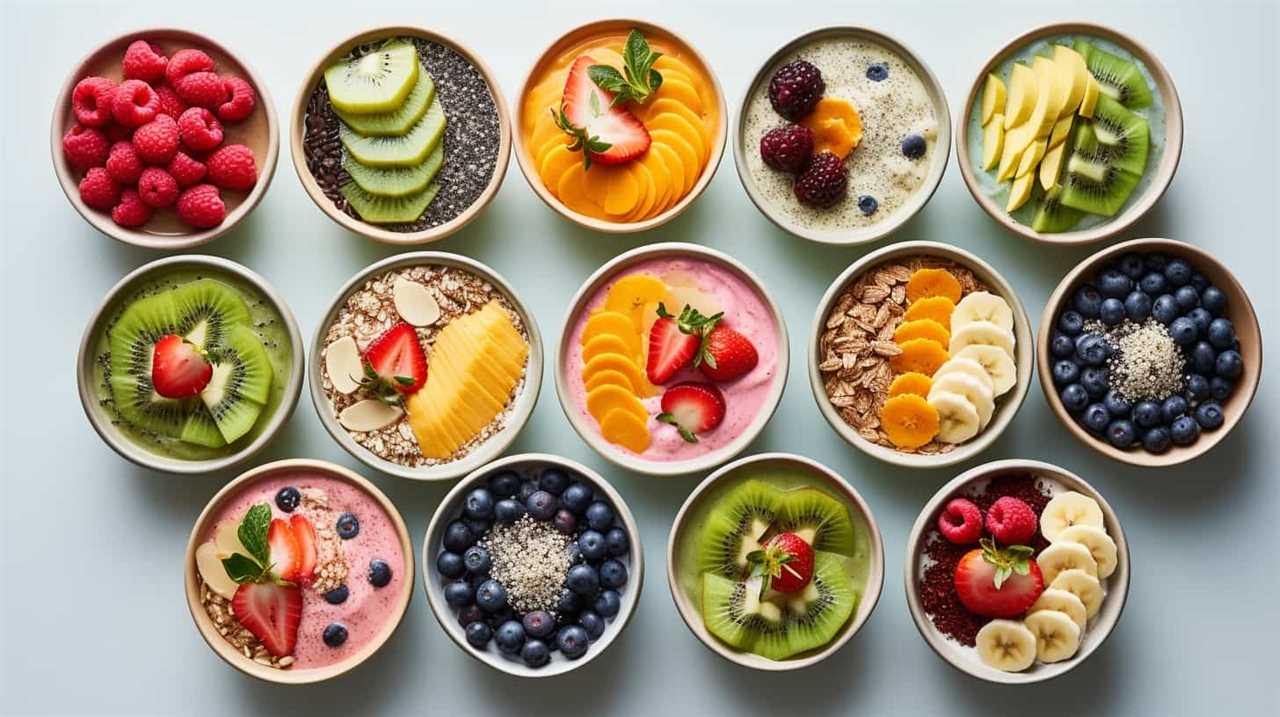
How Do Chia Seeds Compare to Other Superfoods in Terms of Nutritional Value?
When comparing chia seeds to quinoa, you’ll find that chia seeds are higher in fiber and protein. And when comparing chia seeds to flaxseeds, chia seeds have more omega-3 fatty acids.
Can Chia Seeds Help in Reducing Cholesterol Levels or Improving Heart Health?
Chia seeds can be beneficial for heart health and reducing cholesterol levels. They are rich in omega-3 fatty acids and soluble fiber, both of which have been shown to improve heart health and lower cholesterol.
How Should Chia Seeds Be Incorporated Into a Weight Loss Diet for Maximum Effectiveness?
To maximize effectiveness, incorporate chia seeds into your weight loss diet by using them as a meal replacement or adding them to smoothies. For example, replace your breakfast with a chia seed pudding or add them to your post-workout smoothie for added nutrients.
Conclusion
Incorporating chia seeds into your weight loss journey can be a game-changer. These tiny seeds are packed with nutrients, low in calories, and high in fiber, making them a superfood for weight loss. They help stabilize blood sugar levels, provide essential omega-3 fatty acids, and have appetite-suppressing properties.
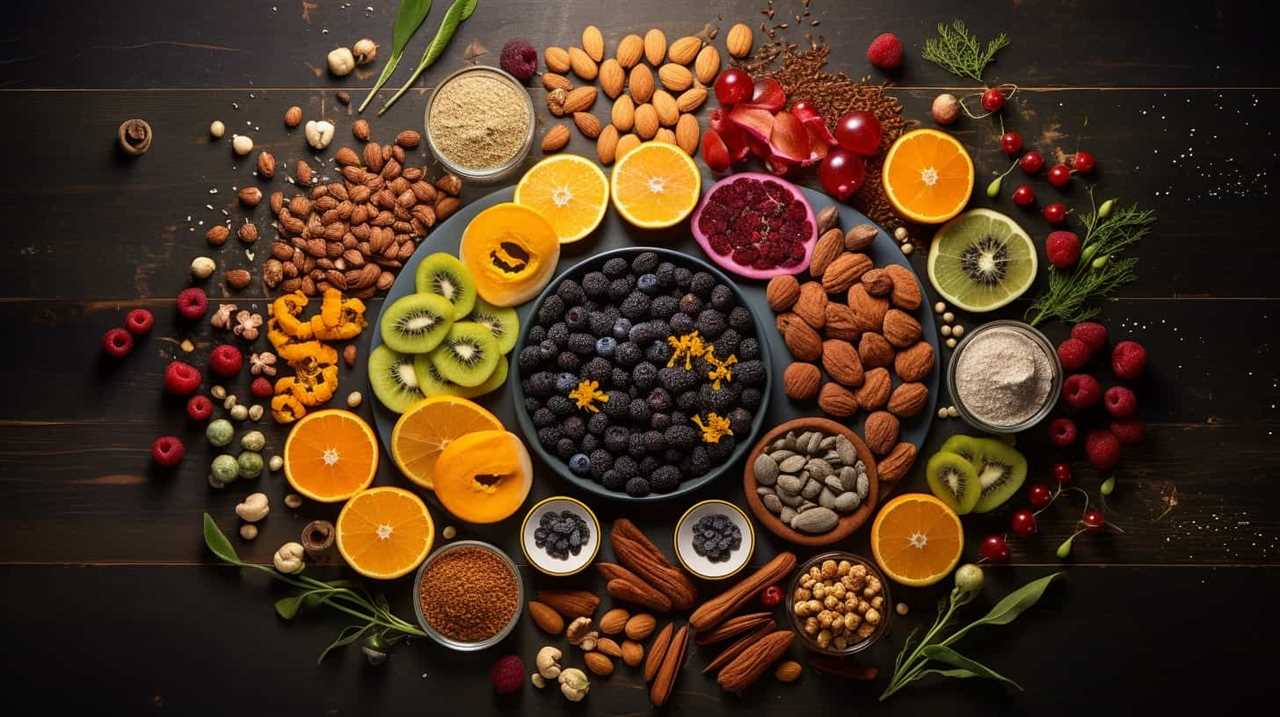
Imagine a spoonful of chia seeds sprinkled on your morning yogurt or blended into a smoothie, working their magic to support your weight loss goals. Give chia seeds a try and see the difference they can make!
Hi, I’m Sarah. I write for Turtle Tree Seeds, a news blog that loves food – all kinds of food. But especially bacon, chocolate, and veggies. We’re on a mission to show the world that you can enjoy all of those things, even kale and brussels sprouts. Because we believe that when it comes to food, there’s no such thing as guilty pleasures. Just pleasures.
I’m also a huge fan of puns (obviously).
Chia Seeds in Weight Loss
9 Best Evidenced Outcomes of Weight Reduction With Tiny Seeds

Are you tired of struggling with weight loss? Imagine a solution that helps you shed the extra pounds while also offering numerous other health benefits. Look no further than these tiny seeds!
These little powerhouses of nutrition have been scientifically proven to aid in weight reduction. With increased feelings of fullness, reduced calorie intake, improved blood sugar control, enhanced metabolism, and decreased waist circumference, incorporating tiny seeds into your diet can be a game-changer on your weight loss journey.
Key Takeaways
- Tiny seeds have satiety effects, helping suppress appetite and increase feelings of fullness.
- Seeds promote satiety, reduce calorie intake, and aid in digestion, preventing bloating.
- Including seeds in the diet can lead to improved blood sugar control.
- Consuming seeds enhances metabolism, increases energy levels, and promotes fat burning.
Increased Feelings of Fullness
By consuming tiny seeds, you can experience increased feelings of fullness. These seeds have been found to have satiety effects, meaning they can help suppress your appetite and make you feel satisfied for longer periods of time. This is due to their high fiber content, which helps slow down the digestion process and keeps you feeling fuller for longer.
The seeds also contain healthy fats and protein, which further contribute to their satiating effects. Incorporating these tiny seeds into your diet can be a practical and effective way to control your appetite and manage your weight. Whether you sprinkle them on your salads, add them to your smoothies, or use them as a topping for your yogurt, these seeds can make a significant difference in promoting feelings of fullness and ultimately supporting your weight reduction goals.

Reduced Calorie Intake
To further support your weight reduction goals, incorporating tiny seeds into your diet can also help you reduce your calorie intake. These little powerhouses are packed with fiber and healthy fats, which can increase satiety and keep you feeling full for longer periods of time. By adding seeds like chia, flax, or hemp to your meals and snacks, you can curb your hunger and prevent overeating.
Here are four ways that tiny seeds can improve your portion control and reduce your calorie intake:
- Sprinkle seeds on top of salads or yogurt to add a satisfying crunch and increase the overall volume of your meal.
- Blend seeds into smoothies or protein shakes to create a thicker texture that will keep you feeling satisfied.
- Use ground seeds as a substitute for breadcrumbs in recipes to decrease the calorie content without sacrificing flavor.
- Mix seeds into your favorite baked goods or oatmeal for added texture and a nutrient boost.
By incorporating these tiny seeds into your diet, you can improve portion control and reduce your calorie intake, supporting your weight reduction goals.
Next, let’s explore how these seeds can also contribute to improved blood sugar control.

Improved Blood Sugar Control
To achieve improved blood sugar control, it’s important that you incorporate tiny seeds into your diet.
Tiny seeds, such as chia seeds and flaxseeds, have been shown to have long-term effects on blood sugar regulation.
These seeds are rich in fiber and healthy fats, which can help slow down the absorption of glucose in the bloodstream.
Additionally, they’ve a low glycemic index, meaning they’ve a minimal impact on blood sugar levels.
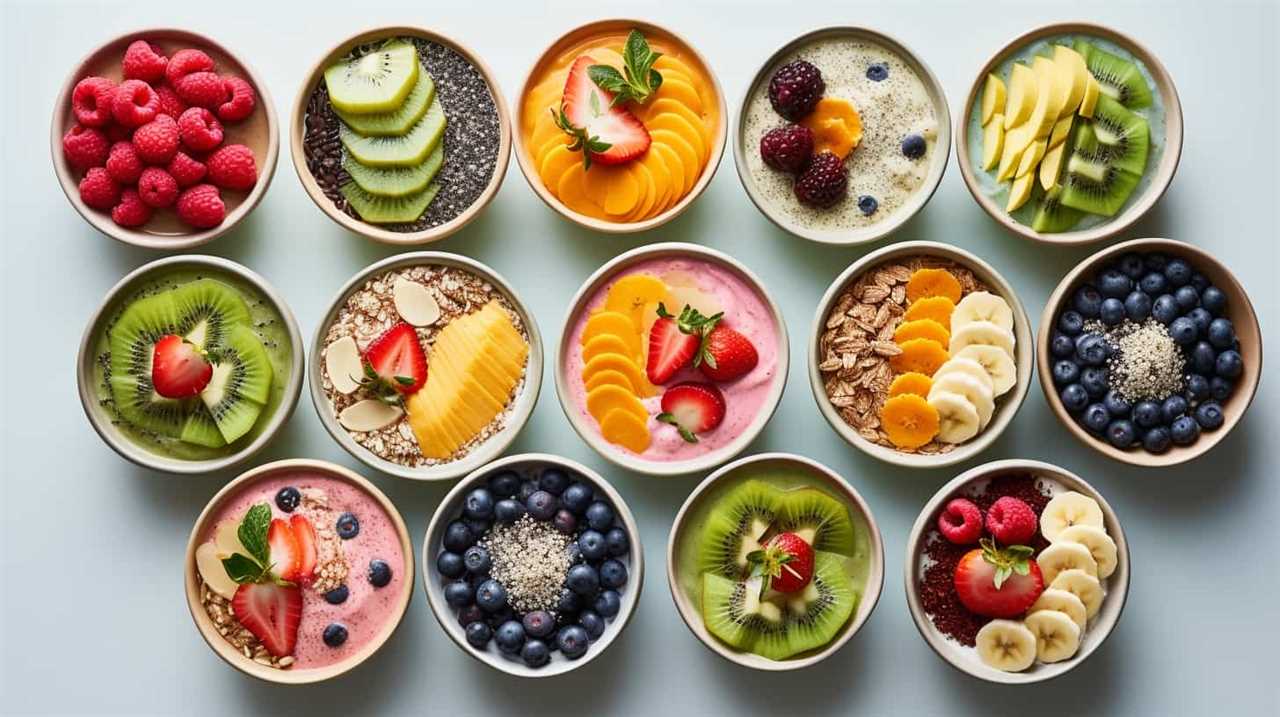
The high fiber content in these seeds also contributes to improved insulin sensitivity, allowing your body to utilize insulin more effectively.
Enhanced Metabolism
Including tiny seeds in your diet can enhance your metabolism. Here are four ways these seeds can boost energy levels and increase fat burning:
-
Chia seeds: These tiny powerhouses are packed with fiber, protein, and omega-3 fatty acids. They can help regulate blood sugar levels and improve digestion, leading to increased energy and fat burning.
-
Flaxseeds: Rich in fiber and healthy fats, flaxseeds can promote satiety and curb cravings. They also contain lignans, which have been shown to support weight loss and improve metabolic health.

-
Pumpkin seeds: These seeds are a great source of magnesium, which plays a crucial role in energy production and metabolism. By including pumpkin seeds in your diet, you can support optimal metabolic function.
-
Sesame seeds: High in antioxidants and healthy fats, sesame seeds can help increase thermogenesis, the process by which your body burns calories to produce heat.
By incorporating these tiny seeds into your diet, you can enhance your metabolism, increase energy levels, and promote fat burning.
This improved metabolic function sets the stage for the next section, where we’ll discuss the impact of these seeds on decreased waist circumference.

Decreased Waist Circumference
By including these tiny seeds in your diet, you can experience a reduction in waist circumference. Decreased waist circumference is one of the key outcomes of weight loss and improved body composition.
When you consume these seeds, they can contribute to weight loss by promoting satiety and reducing overall calorie intake. Additionally, these seeds are rich in fiber, which can aid in digestion and prevent bloating, resulting in a slimmer waistline.
The high nutrient content of these seeds can also support muscle growth and development, which can further contribute to a reduction in waist circumference.
Incorporating these tiny seeds into your diet is a practical and effective way to achieve your weight loss goals and improve your body composition.

Frequently Asked Questions
Are There Any Potential Side Effects or Risks Associated With Consuming Tiny Seeds for Weight Reduction?
There may be potential risks and safety concerns associated with consuming tiny seeds for weight reduction. It is important to be aware of the weight loss hazards, health risks, and potential side effects.
How Long Does It Typically Take to See Noticeable Results in Weight Reduction When Incorporating Tiny Seeds Into the Diet?
On average, it takes a few weeks to start noticing weight reduction when you incorporate tiny seeds into your diet. The benefits of including these seeds are numerous, making it a practical choice for those looking to serve their weight loss goals.
Are There Any Specific Types of Tiny Seeds That Are More Effective for Weight Reduction Than Others?
Chia seeds are effective for weight reduction due to their high fiber and protein content. Flaxseed consumption can also impact weight loss progress by promoting feelings of fullness. Incorporating these tiny seeds into your diet can be a practical way to support your weight loss goals.
Can Tiny Seeds Be Used as a Standalone Weight Loss Method, or Should They Be Combined With Other Lifestyle Changes Such as Exercise and a Balanced Diet?
To achieve the best weight reduction outcomes, it is advisable to combine tiny seeds with other lifestyle changes such as exercise and a balanced diet. While tiny seeds can be effective as a standalone method, the combination yields superior results.
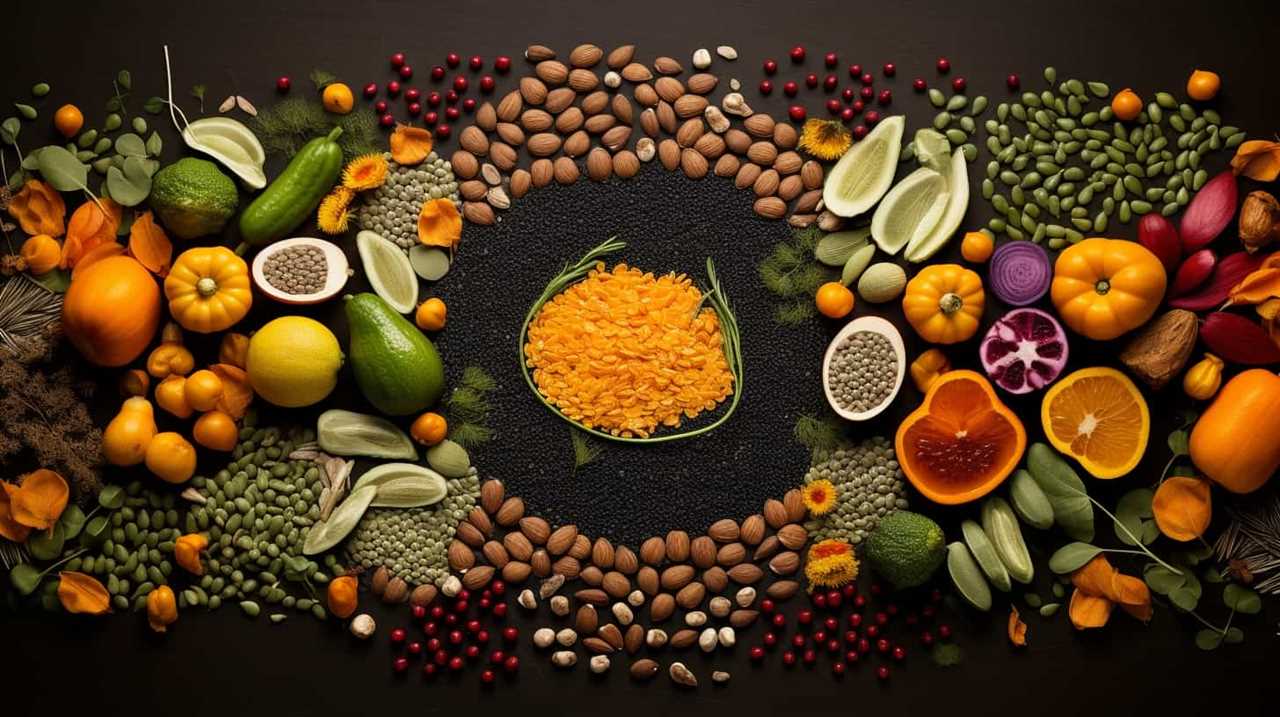
Are There Any Specific Recommendations for the Dosage or Frequency of Consuming Tiny Seeds for Optimal Weight Reduction Results?
For optimal weight reduction results, it is important to consider dosage recommendations and the optimal frequency of consuming tiny seeds. Taking the right amount at the right time can help you achieve your goals.
Conclusion
In conclusion, the evidence strongly supports the positive outcomes of weight reduction with tiny seeds. These seeds have been shown to increase feelings of fullness, reduce calorie intake, improve blood sugar control, enhance metabolism, and decrease waist circumference.
Incorporating these seeds into your diet can have practical benefits for weight management and overall health. So, why wait? Start reaping the benefits of these tiny powerhouses today and take control of your weight and well-being.
Hi, I’m Sarah. I write for Turtle Tree Seeds, a news blog that loves food – all kinds of food. But especially bacon, chocolate, and veggies. We’re on a mission to show the world that you can enjoy all of those things, even kale and brussels sprouts. Because we believe that when it comes to food, there’s no such thing as guilty pleasures. Just pleasures.
I’m also a huge fan of puns (obviously).
Chia Seeds in Weight Loss
9 Best Methods for Consuming Seeds for Weight Loss

Are you ready to unlock the secret to shedding those extra pounds? Look no further, as the solution can be found in the power of seeds! These tiny yet powerful superfoods play a vital role in weight loss. Whether it’s incorporating chia seeds into smoothies or snacking on protein-packed energy bars, the options for incorporating seeds into your diet are endless.
Get ready to embark on a journey towards a healthier, slimmer you with these 9 best methods for consuming seeds for weight loss. Let’s dive in and start serving yourself a plateful of wellness!
Key Takeaways
- Chia seed smoothies and puddings are delicious and nutritious options for incorporating chia seeds into your diet.
- Chia seed salad dressings add flavor and nutrition to salads and can promote weight loss and improve heart health.
- Chia seeds can be incorporated into water infusions, baked goods, and breakfast options like overnight oats, yogurt bowls, protein shakes, and yogurt parfaits.
- Chia seeds are a powerhouse of nutrients, including fiber, protein, and omega-3 fatty acids, and can reduce inflammation and boost the nutritional value of meals.
Chia Seed Smoothies
To maximize the weight loss benefits of chia seeds, incorporate them into your diet through refreshing chia seed smoothies. Chia seed smoothies are a delicious and nutritious way to add these tiny powerhouses to your daily routine.
Not only do chia seeds offer a wealth of essential nutrients like fiber, protein, and omega-3 fatty acids, but they also have the ability to absorb liquid and create a gel-like texture when mixed with water or other liquids. This gel-like consistency helps to keep you feeling fuller for longer, reducing your overall calorie intake.
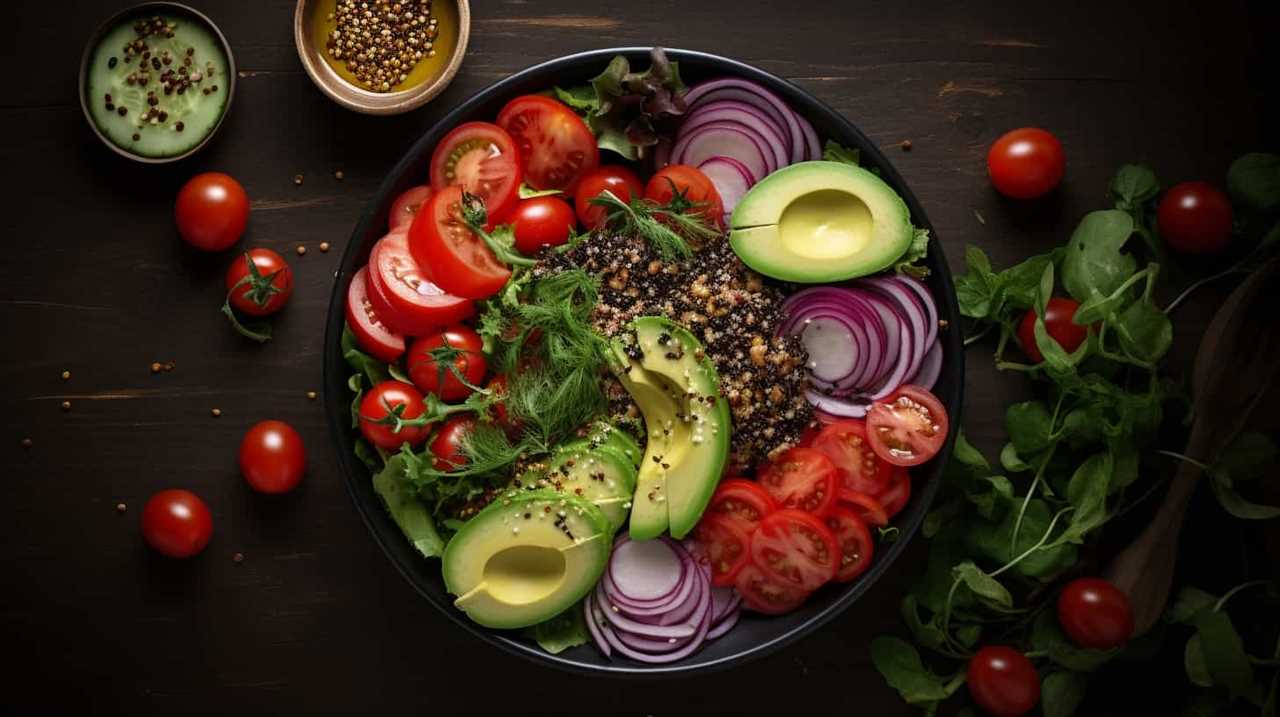
Additionally, chia seeds are low in calories and high in antioxidants, making them an excellent choice for weight loss. Try adding chia seeds to your favorite smoothie recipes or experiment with new creations specifically designed to maximize the benefits of chia seeds for weight loss.
Chia Seed Puddings
Continue reaping the benefits of chia seeds for weight loss by incorporating them into your diet through delicious and nutritious chia seed puddings. Chia seed puddings are a great way to satisfy your sweet tooth while still staying on track with your weight loss goals.
Not only are they easy to make, but they’re also packed with health benefits. Chia seeds are rich in fiber, which helps to keep you feeling full and satisfied for longer periods of time. They also contain omega-3 fatty acids, which can help reduce inflammation and improve heart health.
To make a chia seed pudding, simply combine chia seeds with your choice of liquid, such as almond milk or coconut milk, and let them sit overnight in the refrigerator. In the morning, you’ll have a delicious and nutritious pudding that you can top with your favorite fruits or nuts.
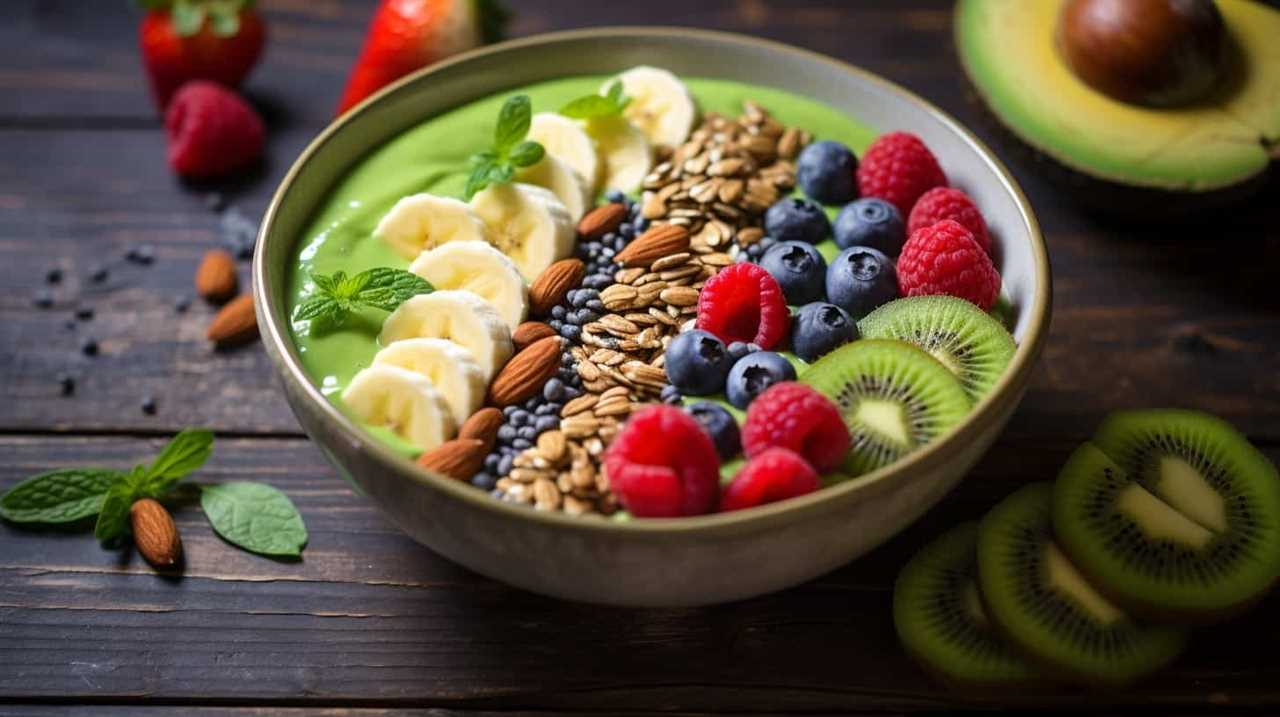
Try out different chia seed pudding recipes to find your favorite flavor combinations and enjoy the weight loss benefits of chia seeds.
Chia Seed Energy Bars
Keep reaping the benefits of chia seeds for weight loss by incorporating them into your diet with these delicious and energy-boosting chia seed bars. Chia seeds are an excellent source of fiber, protein, and healthy fats, making them a perfect addition to your weight loss journey.
Here are four reasons why chia seed energy bars should be a part of your daily routine:
-
They provide a sustained release of energy, keeping you fueled throughout the day.

-
Chia seeds are rich in antioxidants, which help fight inflammation and support overall health.
-
These bars are easy to make and can be customized with your favorite flavors and toppings.
-
Chia seed energy bars are portable and convenient, making them a great option for a quick and nutritious snack on the go.
With their versatility and nutritional benefits, chia seed energy bars are a fantastic way to incorporate chia seeds into your diet.

Next, we’ll explore the topic of chia seed salad dressings.
Chia Seed Salad Dressings
Looking to add some healthy and delicious flavor to your salads? Chia seed salad dressings are a great option! With various recipe variations, you can easily customize your dressing to suit your taste preferences.
Not only do these dressings enhance the flavor of your salads, but they also provide numerous health benefits, thanks to the nutritional powerhouse that’s chia seeds.
Try experimenting with different combinations and serving suggestions to create the perfect chia seed salad dressing for your next meal.
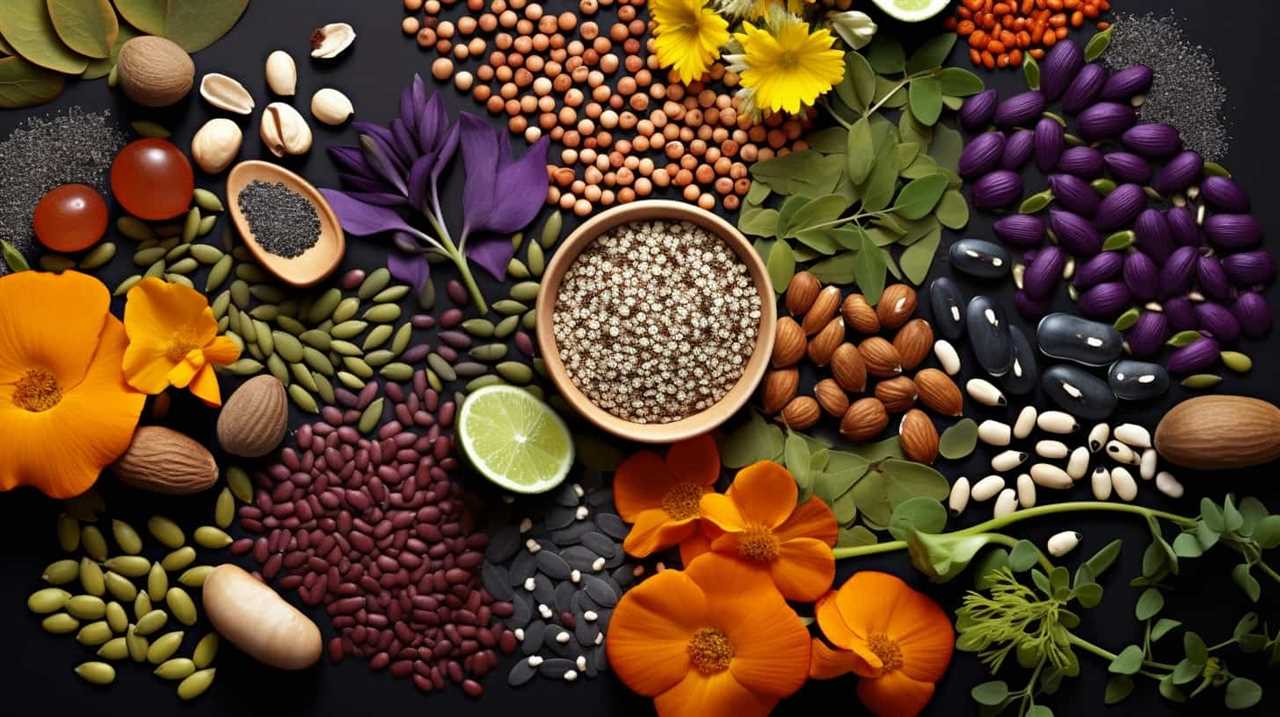
Dressing Recipe Variations
To incorporate chia seeds into your diet more frequently, try making different variations of chia seed salad dressings. Chia seeds are a versatile ingredient that can be used in various ways, including desserts and smoothie bowls. By creating unique dressings with chia seeds, you can add a healthy twist to your salads and enhance their nutritional value.
Here are some recipe variations to get you started:
-
Honey Mustard Chia Dressing: Combine chia seeds, Dijon mustard, honey, apple cider vinegar, and olive oil for a tangy and sweet dressing.
-
Creamy Avocado Chia Dressing: Blend chia seeds with ripe avocados, Greek yogurt, lime juice, and garlic for a creamy and nutritious dressing.

-
Balsamic Chia Vinaigrette: Whisk chia seeds into balsamic vinegar, olive oil, Dijon mustard, honey, and minced shallots for a flavorful and healthy vinaigrette.
-
Asian Sesame Chia Dressing: Mix chia seeds with sesame oil, soy sauce, rice vinegar, ginger, garlic, and a touch of honey for an Asian-inspired dressing.
These chia seed dressings aren’t only delicious but also packed with essential nutrients and healthy fats. Enjoy experimenting with different flavors and incorporating chia seeds into your salads for a satisfying and nutritious meal.
Health Benefits of Chia
To continue exploring the nutritional benefits of chia seeds, let’s delve into the health advantages they offer when incorporated into salad dressings. Chia seeds are a powerhouse of nutrients, packed with fiber, protein, and omega-3 fatty acids. Adding these tiny seeds to your salad dressing not only enhances the flavor and texture but also boosts the nutritional value of your meal.

One of the key health benefits of chia seed salad dressings is their ability to promote weight loss. The high fiber content helps you feel full for longer, reducing overeating and cravings. Additionally, chia seeds have been shown to regulate blood sugar levels and improve digestion, making them a great addition to any weight loss plan.
Incorporating chia seeds into your salad dressings isn’t only beneficial for weight loss but also for overall health. These seeds contain antioxidants that help fight inflammation and protect against chronic diseases. They also support heart health by lowering cholesterol levels and reducing the risk of heart disease.
To incorporate chia seeds into your salad dressings, simply add a tablespoon or two to your favorite recipe. You can also grind the seeds and mix them with other ingredients to create a creamy dressing. Experiment with different flavors and ingredients to find the perfect chia seed salad dressing that suits your taste buds.
Serving Suggestions for Salads
To incorporate chia seed salad dressings into your meals, consider trying these serving suggestions for a nutritious and flavorful addition to your salads:
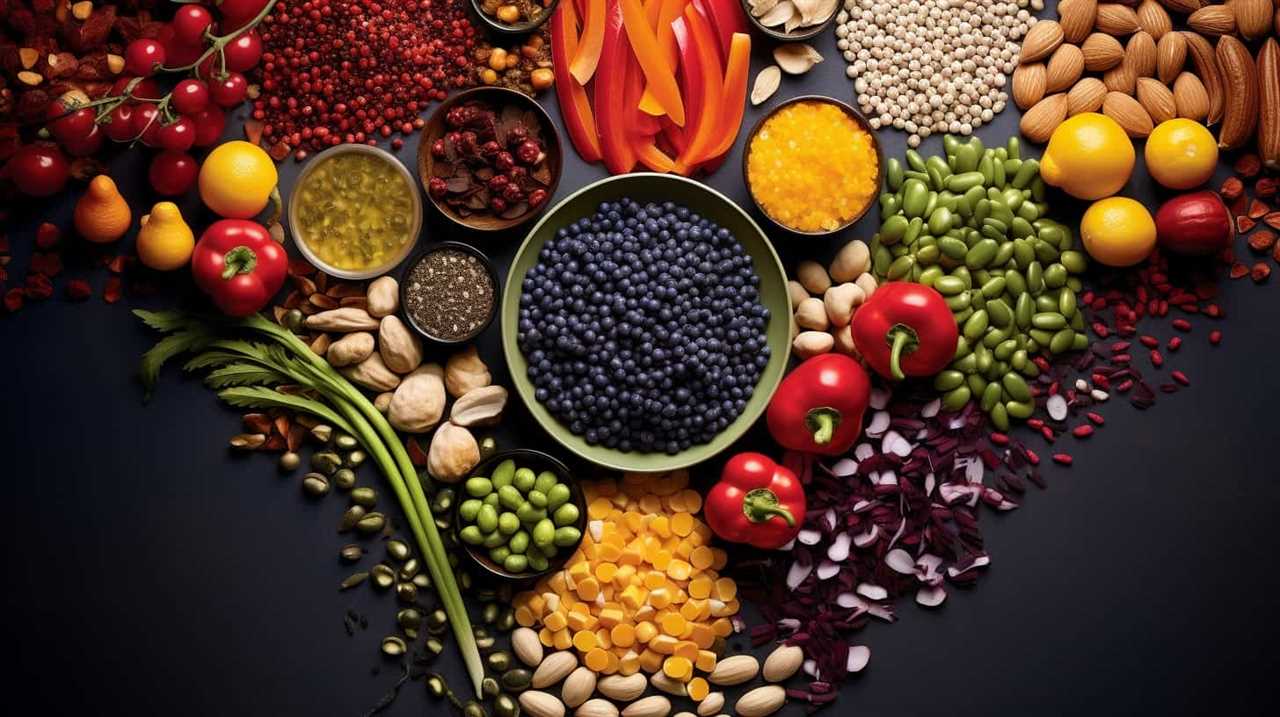
-
Create a creamy chia seed dressing by blending together chia seeds, Greek yogurt, lemon juice, and your choice of herbs and spices. This dressing not only adds a tangy flavor but also provides a boost of protein and omega-3 fatty acids.
-
For a refreshing twist, make a chia seed vinaigrette by whisking together chia seeds, olive oil, apple cider vinegar, Dijon mustard, and honey. This dressing adds a delightful texture and a touch of sweetness to your salad.
-
If you prefer a lighter option, try sprinkling chia seeds directly onto your salad for added crunch and nutritional benefits. They’re a great source of fiber and can help keep you feeling full and satisfied.
-
Experiment with chia seed smoothies or chia seed water infusions as dressings. These unique combinations can add a burst of flavor and provide a hydrating element to your salads.

Now, let’s move on to the next section, where we’ll explore the versatile use of chia seeds in overnight oats.
Chia Seed Overnight Oats
For the best results in incorporating chia seeds into your weight loss journey, try preparing chia seed overnight oats. Overnight oats are a convenient and nutritious breakfast option that can help you stay on track with your weight loss goals. To make chia seed overnight oats, simply mix together rolled oats, chia seeds, milk or plant-based milk, and your choice of sweetener or flavorings. Let the mixture sit in the refrigerator overnight, and in the morning, you’ll have a delicious and filling breakfast waiting for you.
Chia seeds are a great addition to overnight oats because they add a boost of fiber and healthy fats, which can help keep you feeling full and satisfied throughout the morning. Plus, chia seeds absorb liquid and become gel-like, creating a creamy and thick texture in your oats.
In the previous section, we discussed other ways to incorporate chia seeds into your diet, such as chia seed pancakes and chia seed smoothie bowls. These options provide variety and allow you to enjoy the nutritional benefits of chia seeds in different ways.

Now, let’s move on to the next section, where we’ll explore another delicious option: chia seed yogurt bowls.
Chia Seed Yogurt Bowls
To make a delicious and nutritious chia seed yogurt bowl, start by selecting your favorite type of yogurt. Add a spoonful of chia seeds for a boost of fiber and omega-3 fatty acids. Top it off with fresh berries like strawberries, blueberries, or raspberries for added antioxidants and natural sweetness. Sprinkle some granola or nuts for a delightful crunch and extra protein. Drizzle a spoonful of honey or maple syrup for a touch of sweetness, if desired.
Chia seed yogurt bowls aren’t only easy to make but also packed with nutrients that can support weight loss. They’re a great alternative to chia seed smoothie bowls, providing a creamy and satisfying texture.
Now, let’s move on to the next section about ‘chia seed protein shakes’ to discover another delicious way to enjoy chia seeds in your weight loss journey.

Chia Seed Protein Shakes
Looking to boost your weight loss efforts? Chia seed protein shakes are a great option to consider.
Not only are chia seeds packed with essential nutrients, but protein shakes can help you feel fuller for longer, reducing your overall calorie intake.
Incorporating these shakes into your diet may contribute to more effective weight loss.
Nutritional Benefits of Chia
You can regularly incorporate chia seed protein shakes into your diet to maximize the nutritional benefits of chia seeds. Chia seeds are packed with essential nutrients that can support your overall health and weight loss goals.
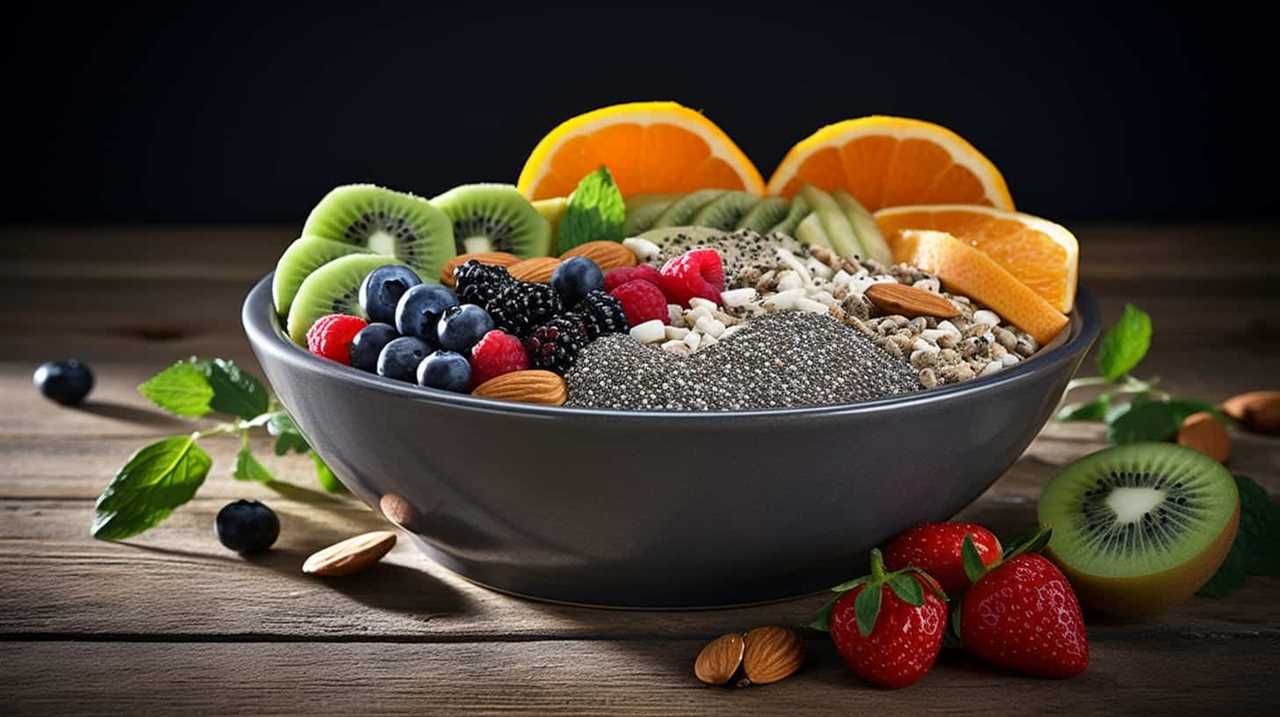
Here are some key reasons why chia seed protein shakes are a great addition to your diet:
-
High in protein: Chia seeds are an excellent plant-based source of protein, which can help keep you feeling full and satisfied.
-
Rich in fiber: Chia seeds are one of the best sources of dietary fiber, promoting digestive health and aiding in weight management.
-
Omega-3 fatty acids: Chia seeds are loaded with omega-3 fatty acids, which are essential for brain health and reducing inflammation in the body.

-
Antioxidant power: Chia seeds are packed with antioxidants, which can protect your cells from damage and support overall well-being.
Incorporating chia seed protein shakes into your diet is a convenient and delicious way to reap the many health benefits of chia seeds.
Protein Content in Shakes
If you want to maximize your protein intake while enjoying the nutritional benefits of chia seeds, incorporating chia seed protein shakes into your diet is an excellent option.
Protein shake recipes that include chia seeds can provide you with a convenient and delicious way to boost your protein consumption.

Chia seeds are a great source of plant-based protein, containing all nine essential amino acids that your body needs.
Protein is an important nutrient for weight loss as it helps to increase feelings of fullness, boost metabolism, and preserve lean muscle mass.
By incorporating chia seed protein shakes into your diet, you can easily increase your protein intake and support your weight loss goals.
Weight Loss Effectiveness
To maximize the effectiveness of chia seed protein shakes for weight loss, it’s important to incorporate them into your daily routine. Chia seeds are known for their high protein content and have been shown to aid in weight loss strategies. Here are four ways that chia seed protein shakes can help you achieve your weight loss goals:
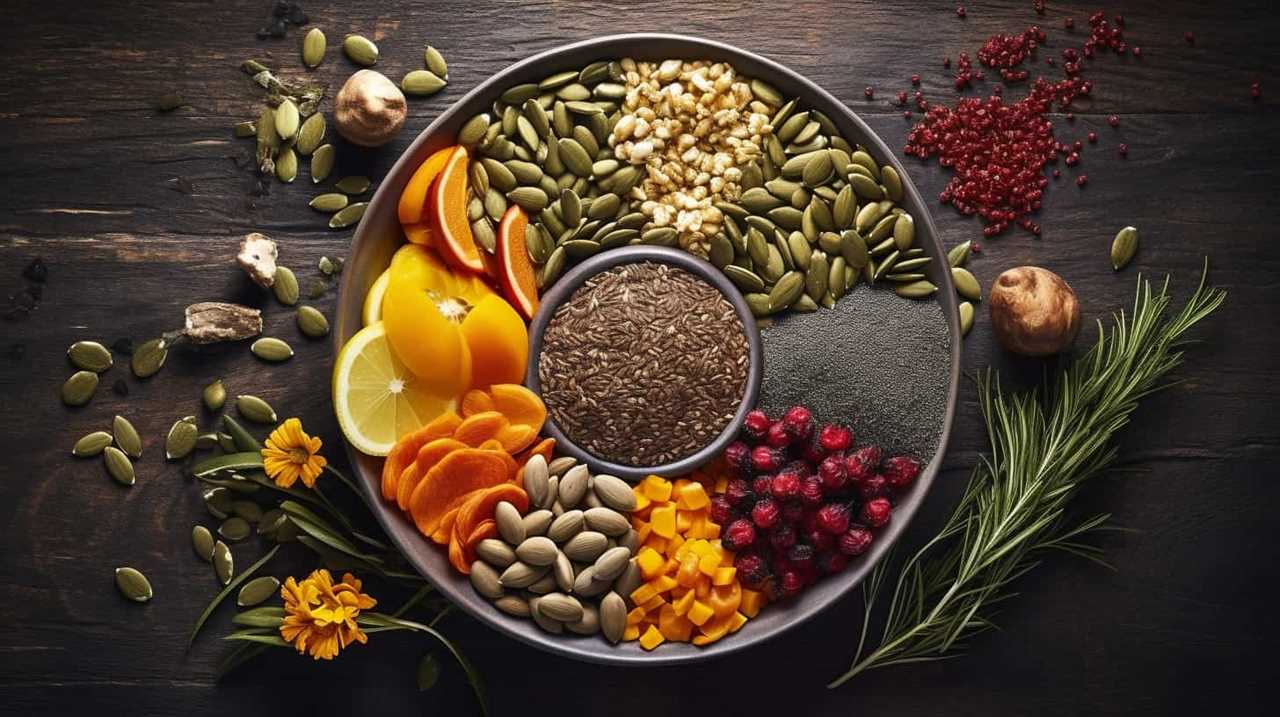
- Increased satiety: Chia seeds absorb liquid and expand in your stomach, helping you feel fuller for longer.
- Balanced nutrition: Chia seeds are packed with essential nutrients, including fiber, omega-3 fatty acids, and antioxidants, which support overall health and weight management.
- Blood sugar regulation: Chia seeds can help stabilize blood sugar levels, reducing cravings and preventing overeating.
- Muscle recovery: The protein in chia seeds aids in muscle repair and growth, making chia seed protein shakes a great option for post-workout recovery.
In the next section, we’ll explore the benefits of chia seed water infusions for weight loss.
Chia Seed Water Infusions
One effective way to incorporate chia seeds into your weight loss regimen is by preparing refreshing chia seed water infusions. These infusions provide a convenient and hydrating way to enjoy the benefits of chia seeds while aiding in weight loss. Chia seeds are packed with fiber, protein, and omega-3 fatty acids, which can help you feel fuller for longer and reduce cravings. By soaking chia seeds in water, they form a gel-like consistency that can enhance hydration and promote satiety. To give you a better idea of the various chia seed water infusion options available, here is a table showcasing five delicious and healthy combinations:
| Infusion Flavor | Ingredients | Benefits |
|---|---|---|
| Lemon and Mint | Chia seeds, lemon, mint | Detoxification, digestion |
| Raspberry and Lime | Chia seeds, raspberries, lime | Antioxidants, immune support |
| Cucumber and Basil | Chia seeds, cucumber, basil | Hydration, anti-inflammatory |
| Pineapple and Ginger | Chia seeds, pineapple, ginger | Digestion, metabolism booster |
| Watermelon and Mint | Chia seeds, watermelon, mint | Hydration, vitamin C |
These chia seed water infusions not only provide a refreshing way to stay hydrated but also offer various health benefits that can support your weight loss journey. So go ahead and experiment with these flavors to find your favorite combination and enjoy the goodness of chia seeds in a delicious and nutritious way!
Chia Seed Baked Goods
You can easily incorporate chia seeds into your weight loss journey by frequently enjoying delicious chia seed baked goods. These delightful treats not only satisfy your sweet tooth but also provide you with the nutritional benefits of chia seeds. Here are some mouthwatering options to try:

-
Chia Seed Pancakes: Whip up a batch of fluffy pancakes by adding chia seeds to your favorite pancake recipe. The seeds add a subtle crunch and boost the fiber content, helping you stay fuller for longer.
-
Chia Seed Granola: Make your own granola at home with a sprinkle of chia seeds. Not only will it add a delightful crunch, but the seeds also provide a dose of omega-3 fatty acids and antioxidants.
-
Chia Seed Muffins: Add chia seeds to your muffin batter for a nutritious twist. These fiber-rich muffins make for a satisfying snack or breakfast option.
-
Chia Seed Bread: Bake a loaf of chia seed bread for a healthy alternative to regular bread. The seeds add texture and help increase the nutritional value of your sandwich.

Frequently Asked Questions
Can Chia Seeds Be Eaten Raw, or Do They Need to Be Soaked or Cooked Before Consuming?
Chia seeds are versatile and can be eaten raw, soaked, or cooked. They provide numerous health benefits, including weight loss support. Incorporate chia seeds into your diet with delicious recipes like chia pudding or sprinkle them on salads and smoothies.
Are There Any Potential Side Effects or Allergies Associated With Consuming Chia Seeds?
You might experience potential side effects or allergies when consuming chia seeds. It’s important to be aware of these risks and consult with a healthcare professional if you have any concerns.
How Much Chia Seeds Should I Consume Daily for Weight Loss Purposes?
To achieve weight loss with chia seeds, consume about 1-2 tablespoons daily. Try incorporating them into chia seed pudding recipes for a delicious and nutritious treat that can help you reach your goals.
Can Chia Seeds Be Used as a Replacement for Eggs in Baking Recipes?
Yes, chia seeds can be used as a replacement for eggs in baking recipes. They act as a great vegan substitute and provide added benefits like omega-3 fatty acids and fiber. Chia seeds are often compared to flax seeds for their nutritional value.

Are There Any Specific Nutritional Benefits or Advantages to Consuming Chia Seeds in Different Forms, Such as Smoothies or Salads, Compared to Eating Them Plain?
There are specific nutritional benefits to consuming chia seeds in different forms, like smoothies or salads. Chia seeds are a superfood for weight loss, as they are high in fiber, protein, and omega-3 fatty acids.
Conclusion
Incorporating seeds into your weight loss journey can be both enjoyable and beneficial. From chia seed smoothies to chia seed baked goods, there are various delicious ways to consume these nutrient-packed seeds.
Remember the adage, ‘Don’t judge a book by its cover,’ as seeds may appear small but offer significant health benefits.
So, start experimenting with these methods and discover a healthier, tastier way to shed those extra pounds.

Hi, I’m Sarah. I write for Turtle Tree Seeds, a news blog that loves food – all kinds of food. But especially bacon, chocolate, and veggies. We’re on a mission to show the world that you can enjoy all of those things, even kale and brussels sprouts. Because we believe that when it comes to food, there’s no such thing as guilty pleasures. Just pleasures.
I’m also a huge fan of puns (obviously).
Chia Seeds in Weight Loss
9 Reliable Risk-Free Ways Seeds Aid Weight Reduction

Looking for a reliable and secure way to support you on your journey towards weight loss? Look no further than seeds! These tiny yet powerful sources are packed with nutrients that can help you reach your weight loss goals.
From boosting your metabolism to controlling hunger and cravings, seeds offer a natural solution for shedding those extra pounds.
Incorporate them into your diet and enjoy the benefits of increased satiety, balanced blood sugar levels, and improved digestion.
Start your weight loss journey with the help of these nine seed-based strategies.
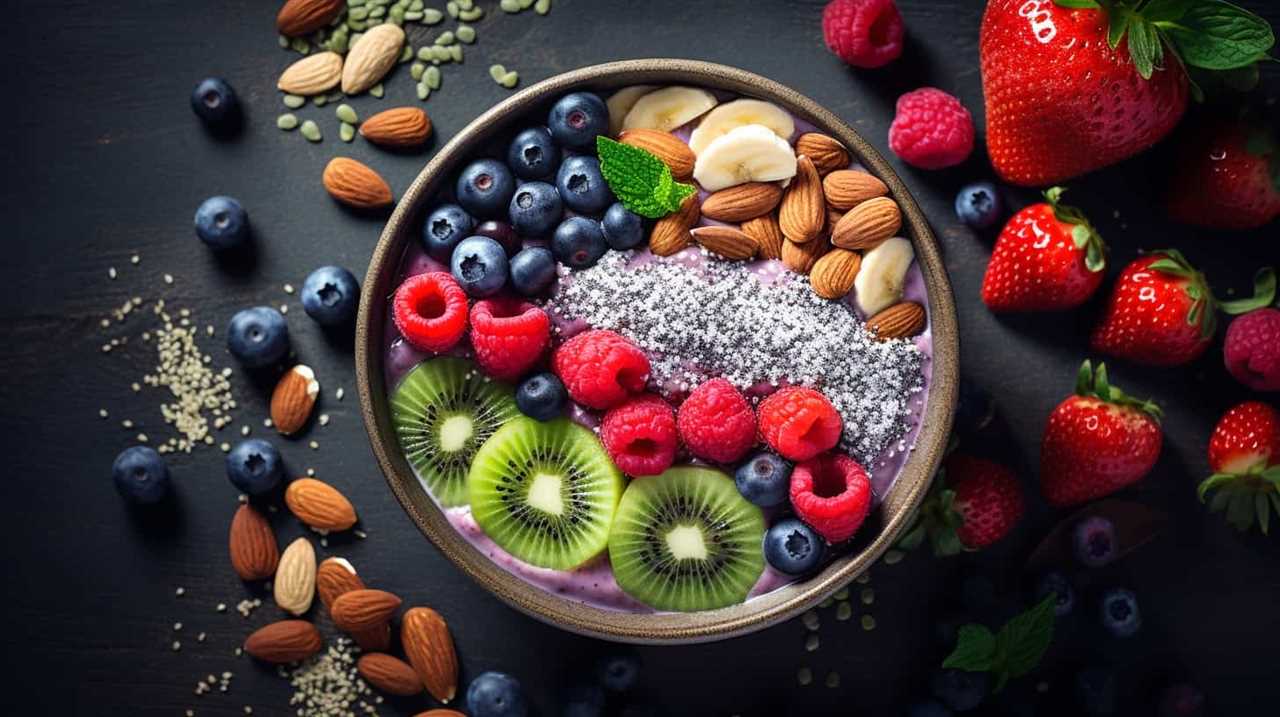
Key Takeaways
- Chia seeds are packed with nutrients like fiber, protein, and omega-3 fatty acids, making them a smart choice for weight loss.
- Chia seeds can boost metabolism and support weight loss goals due to their high protein and fiber content.
- Chia seeds can be consumed in various ways, such as making chia pudding, adding them to smoothies, sprinkling them over salads, or incorporating them into baked goods.
- Chia seeds help control hunger and cravings naturally by promoting satiety and reducing appetite through their fiber and protein content.
Chia Seeds: A Natural Weight Loss Solution
To start your weight loss journey with chia seeds, begin by incorporating them into your daily diet and see the results. Chia seeds are an excellent addition to any weight loss plan due to their numerous health benefits. These tiny seeds are packed with nutrients, including fiber, protein, and omega-3 fatty acids.
By including chia seeds in your diet, you can feel fuller for longer, making it easier to resist unhealthy snacks and overeating. Additionally, chia seeds can enhance your exercise routine. They provide a steady release of energy, helping you power through workouts and improve your endurance.
You can easily incorporate chia seeds into your meals by adding them to smoothies, oatmeal, or even making chia seed puddings. With their versatility and nutritional benefits, chia seeds are a smart choice for anyone looking to shed excess weight.
Boosting Metabolism With Chia Seeds
Boost your metabolism with the help of chia seeds.

These tiny seeds are packed with nutrients that can aid in weight loss.
Incorporating chia seeds into your diet can provide a natural and effective way to boost your metabolism and support your weight loss goals.
Chia Seeds and Metabolism
Start revving up your metabolism by incorporating chia seeds into your diet. These tiny seeds have been shown to have numerous health benefits, including their ability to boost your metabolism. Here’s how chia seeds can help improve your metabolism:
-
High in Protein: Chia seeds are an excellent source of plant-based protein, which can help increase your metabolic rate. Protein requires more energy to digest compared to fats and carbohydrates, thus boosting your metabolism in the process.

-
Rich in Fiber: Chia seeds are packed with fiber, which helps regulate digestion and keeps you feeling full for longer. This can prevent overeating and promote weight loss.
-
Omega-3 Fatty Acids: Chia seeds are one of the richest plant-based sources of omega-3 fatty acids. These healthy fats can improve nutrient absorption and enhance metabolic function.
-
Antioxidants: Chia seeds are loaded with antioxidants that help protect your cells from damage and support overall health. By reducing oxidative stress, they can help optimize metabolic processes.
Incorporating chia seeds into your diet is an easy and effective way to boost your metabolism while enjoying a nutritious and delicious addition to your meals.

Weight Loss Benefits
Incorporating chia seeds into your diet can contribute to weight loss by enhancing your metabolism. Chia seeds are rich in fiber, which can help boost your metabolism and promote feelings of fullness. When you consume foods high in fiber, like chia seeds, they take longer to digest, keeping you satisfied for longer periods of time. This can prevent overeating and snacking on unhealthy foods throughout the day.
Additionally, chia seeds contain omega-3 fatty acids, which have been shown to increase metabolism and aid in weight loss. These fatty acids help reduce inflammation in the body, which can contribute to weight gain. By including chia seeds in your diet, you can enjoy their weight loss benefits as natural appetite suppressants and metabolism boosters.
How to Consume
To maximize the metabolism-boosting effects of chia seeds, include them in your daily meals and snacks. Here are some different ways to prepare chia seeds for consumption and some creative recipes using chia seeds for weight loss:
-
Chia Pudding: Mix chia seeds with your favorite milk (dairy or plant-based) and let it sit overnight. In the morning, you’ll have a creamy and nutritious pudding that can be topped with fruits or nuts.

-
Smoothies: Add a tablespoon of chia seeds to your favorite smoothie recipe for an extra boost of fiber and omega-3 fatty acids.
-
Salads: Sprinkle chia seeds over your salads to add crunch and nutritional value. They can also act as a healthier alternative to croutons.
-
Baked Goods: Incorporate chia seeds into your baked goods like muffins, bread, or cookies. They can add texture and nutritional benefits without altering the taste too much.
Controlling Hunger and Cravings With Chia Seeds
Are you struggling to control your hunger and cravings while trying to lose weight?

Chia seeds can help suppress your appetite naturally and manage food cravings effectively.
These tiny seeds are packed with fiber, which expands in your stomach and promotes a feeling of fullness.
Suppressing Appetite Naturally
Control your hunger and cravings with chia seeds, an effective way to naturally suppress your appetite. Chia seeds are a great addition to your diet as they can help you feel fuller for longer, preventing overeating and aiding weight loss. Here are some ways chia seeds can help suppress your appetite:
- Chia seeds absorb liquid and expand in your stomach, creating a feeling of fullness.
- They contain a high amount of fiber, which slows down digestion and keeps you satisfied.
- Chia seeds are rich in omega-3 fatty acids, which have been shown to reduce hunger and cravings.
- They also provide protein, which can help curb your appetite and regulate blood sugar levels.
By incorporating chia seeds into your meals and snacks, you can naturally suppress your appetite and stay on track with your weight loss goals.

Now, let’s explore how to manage food cravings effectively.
Managing Food Cravings Effectively
To effectively manage food cravings and control hunger with chia seeds, incorporate them into your daily meals and snacks. Chia seeds are rich in fiber and protein, which can help you feel fuller for longer periods. This can prevent overeating and reduce the likelihood of succumbing to cravings.
Additionally, chia seeds contain omega-3 fatty acids, which have been shown to reduce inflammation and improve brain function. Managing emotional eating can also be achieved by practicing mindful eating techniques. This involves being present and fully aware of your eating experience, paying attention to the taste, texture, and smell of your food.
Enhancing Digestion for Weight Loss With Chia Seeds
Improving digestion is key to achieving weight loss with the help of chia seeds. Chia seeds have been found to be effective in reducing bloating and promoting healthy digestion. Here are some ways chia seeds can enhance your digestion for weight loss:

- Chia seeds are rich in fiber, which helps regulate bowel movements and prevents constipation.
- The gel-like consistency of chia seeds when mixed with liquid can soothe the digestive system and reduce inflammation.
- Chia seeds contain prebiotics that promote the growth of healthy gut bacteria, supporting a healthy digestive tract.
- Chia seeds can help stabilize energy levels, preventing the energy crashes often associated with poor digestion.
By incorporating chia seeds into your diet, you can support better digestion and improve your weight loss journey.
Now, let’s explore how chia seeds can help in balancing blood sugar levels.
Balancing Blood Sugar Levels With Chia Seeds
Achieving balanced blood sugar levels can be facilitated by incorporating chia seeds into your diet. Chia seeds are a powerful superfood that can help regulate blood sugar levels and improve insulin sensitivity.
These tiny seeds are packed with nutrients such as fiber, protein, and healthy fats, which can slow down the digestion of carbohydrates and prevent spikes in blood sugar levels. The high fiber content in chia seeds forms a gel-like substance in the stomach, which slows the absorption of sugar into the bloodstream and helps maintain stable blood sugar levels throughout the day.

Additionally, chia seeds contain omega-3 fatty acids, which have been shown to improve insulin sensitivity and reduce the risk of developing insulin resistance.
Promoting Healthy Gut Flora With Chia Seeds
Incorporating chia seeds into your diet can contribute to promoting a healthy gut flora. Chia seeds are packed with fiber, which acts as a prebiotic, nourishing the beneficial bacteria in your gut.
Here are some ways chia seeds can support your gut health:
-
Chia seeds and heart health: Chia seeds contain omega-3 fatty acids, which have been linked to a reduced risk of heart disease. By including chia seeds in your diet, you can support a healthy heart while also promoting a healthy gut.

-
Chia seeds and immune system: Chia seeds are rich in antioxidants, vitamins, and minerals that can help support a strong immune system. A healthy gut flora is essential for a well-functioning immune system, and chia seeds can play a role in maintaining that balance.
Increasing Satiety and Feeling Fuller With Chia Seeds
To further support your weight reduction goals, you can enhance satiety and feel fuller by including chia seeds in your meals and snacks. Chia seeds are packed with nutrients and offer numerous benefits for weight loss. One of the key ways chia seeds help increase satiety is by absorbing liquid and expanding in your stomach, creating a feeling of fullness. Additionally, chia seeds are high in fiber, which slows down digestion and promotes a longer-lasting feeling of fullness. Incorporating chia seeds into your diet can also help with portion control, as they add volume to your meals without adding a significant amount of calories. Here is a table that highlights the nutritional content of chia seeds:
| Nutrient | Amount per 1 oz (28g) |
|---|---|
| Fiber | 10.6 grams |
| Protein | 4.7 grams |
| Omega-3 fatty acids | 4.9 grams |
| Calcium | 177 mg |
| Iron | 1.6 mg |
Including chia seeds in your meals and snacks can provide you with increased energy, promote satiety, and support your weight reduction journey.
Reducing Inflammation and Weight Gain With Chia Seeds
By including chia seeds in your diet, you can effectively reduce inflammation and prevent weight gain. Chia seeds are packed with essential nutrients that offer numerous health benefits. Here’s how chia seeds can help you in reducing inflammation and weight gain:
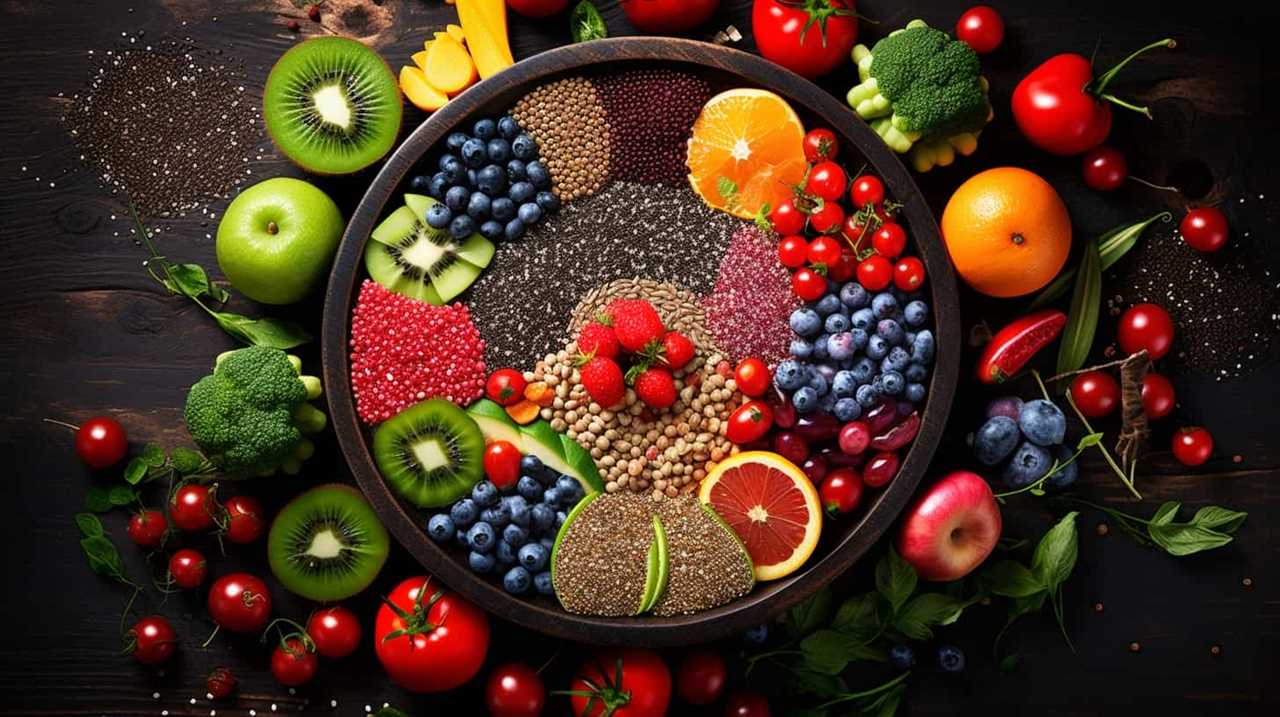
-
Chia seeds are rich in omega-3 fatty acids, which have anti-inflammatory properties and can help reduce inflammation in the body.
-
They contain high levels of antioxidants, such as flavonoids, which can help protect your body against oxidative stress and inflammation.
-
Chia seeds are a good source of fiber, which can aid in weight loss by promoting feelings of fullness and reducing calorie intake.
-
They’ve a low glycemic index, meaning they’re digested slowly and can help stabilize blood sugar levels, which is important for weight management.

Incorporating chia seeds into a balanced diet for weight loss is a simple and effective way to reduce inflammation and prevent weight gain.
Incorporating Chia Seeds Into a Balanced Diet for Weight Loss
To successfully include chia seeds in your balanced diet for weight loss, prioritize their incorporation as a key element for achieving your health goals.
Chia seeds can be a versatile and nutritious addition to your meals, helping you feel fuller for longer and promoting weight loss.
One way to incorporate chia seeds into your diet is by using them in various recipes specifically designed for weight loss. Chia seed pudding, smoothies, and overnight oats are just a few examples of delicious and satisfying options.

Additionally, chia seeds can be used as a substitute for high-calorie ingredients in baking and cooking. For example, you can replace eggs with chia gel or use ground chia seeds as a binding agent in recipes like meatballs or burgers.
Frequently Asked Questions
Are There Any Potential Side Effects or Risks Associated With Consuming Chia Seeds for Weight Loss?
There are potential risks and health concerns associated with consuming chia seeds for weight loss. It’s important to consult with a healthcare professional to ensure it is safe for you.
How Long Does It Typically Take to See Weight Loss Results When Incorporating Chia Seeds Into a Diet?
To effectively incorporate chia seeds into your weight loss diet, it’s important to understand the timeline. While individual results may vary, many people start seeing weight loss results within a few weeks of consistent consumption.
Can Chia Seeds Be Used as a Meal Replacement for Weight Loss?
Looking to shed some pounds? Chia seeds can be a great meal replacement alternative in your weight loss journey. Try incorporating them in weight loss smoothies for a nutritious and filling option.

Are There Any Specific Guidelines or Recommendations for the Amount of Chia Seeds to Consume for Weight Loss?
To aid weight loss, you should consider the recommended chia seed intake. Chia seeds are known to be beneficial, but it’s important to follow specific guidelines and recommendations for the best results.
Can Chia Seeds Be Used to Target Specific Areas of Body Fat for Weight Reduction?
Chia seeds are effective for weight reduction, but they can’t target specific areas of body fat. However, incorporating them into a balanced diet can contribute to overall weight loss.
Conclusion
In conclusion, chia seeds offer a reliable and risk-free solution for weight loss. By boosting metabolism, controlling hunger and cravings, enhancing digestion, and balancing blood sugar levels, chia seeds can aid in shedding unwanted pounds.
Additionally, they promote healthy gut flora, increase satiety, reduce inflammation, and help prevent weight gain.
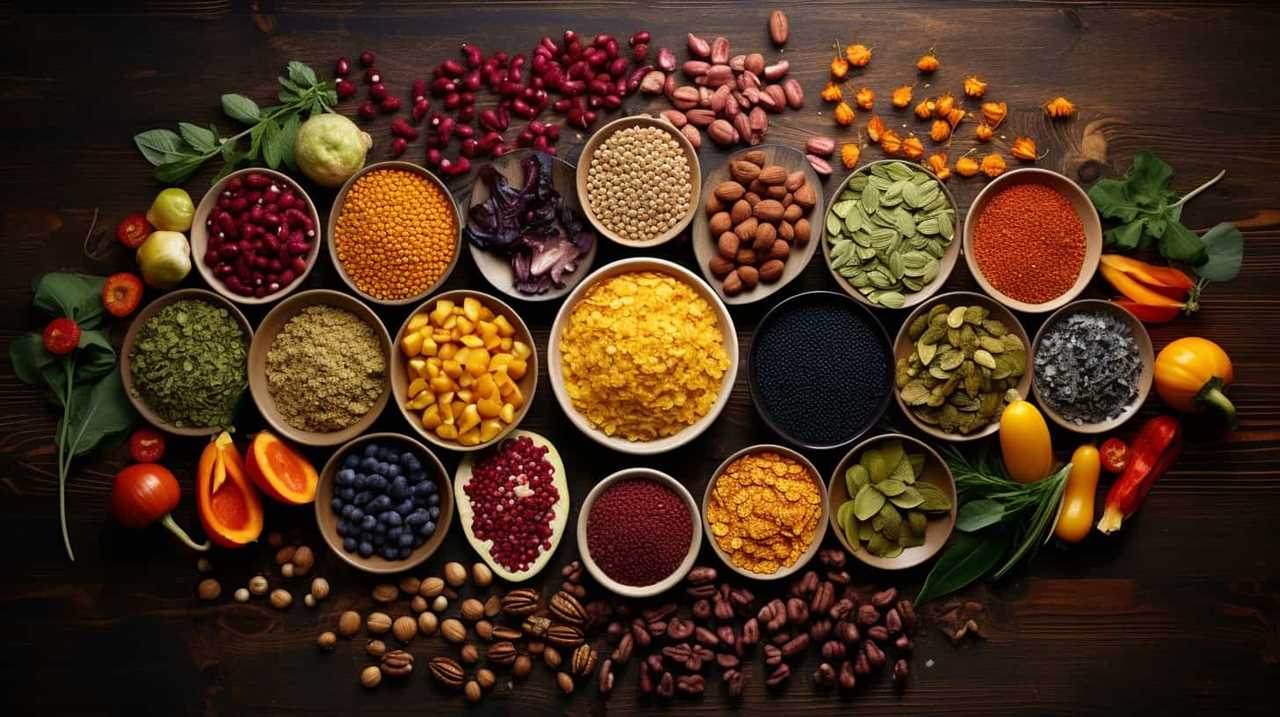
By incorporating chia seeds into a balanced diet, individuals can enjoy the benefits of these tiny but mighty seeds on their weight loss journey.
Hi, I’m Sarah. I write for Turtle Tree Seeds, a news blog that loves food – all kinds of food. But especially bacon, chocolate, and veggies. We’re on a mission to show the world that you can enjoy all of those things, even kale and brussels sprouts. Because we believe that when it comes to food, there’s no such thing as guilty pleasures. Just pleasures.
I’m also a huge fan of puns (obviously).
-

 Chia Seeds3 months ago
Chia Seeds3 months agoCan Cats Have Chia Seeds?
-

 Chia Seeds3 months ago
Chia Seeds3 months agoHow Do Chia Seeds Go Bad?
-

 Chia Seeds3 months ago
Chia Seeds3 months agoDo Chia Seeds Make You Poop?
-

 Health Risks and Allergies Related to Chia Seeds3 months ago
Health Risks and Allergies Related to Chia Seeds3 months agoWhy Do Chia Seeds Gel
-

 Chia Seeds3 months ago
Chia Seeds3 months agoHow to Use Chia Seeds For Weight Loss
-

 Chia Seeds and Digestive Health2 weeks ago
Chia Seeds and Digestive Health2 weeks agoWhy Are Chia Seeds Beneficial For Gut Health?
-

 Chia Seeds3 months ago
Chia Seeds3 months agoHealth Benefits of Chia Seeds For Dogs
-

 Chia Seeds in Gluten-Free Diets2 months ago
Chia Seeds in Gluten-Free Diets2 months agoYour Dependable Guide: Chia as a Gluten Substitute


























